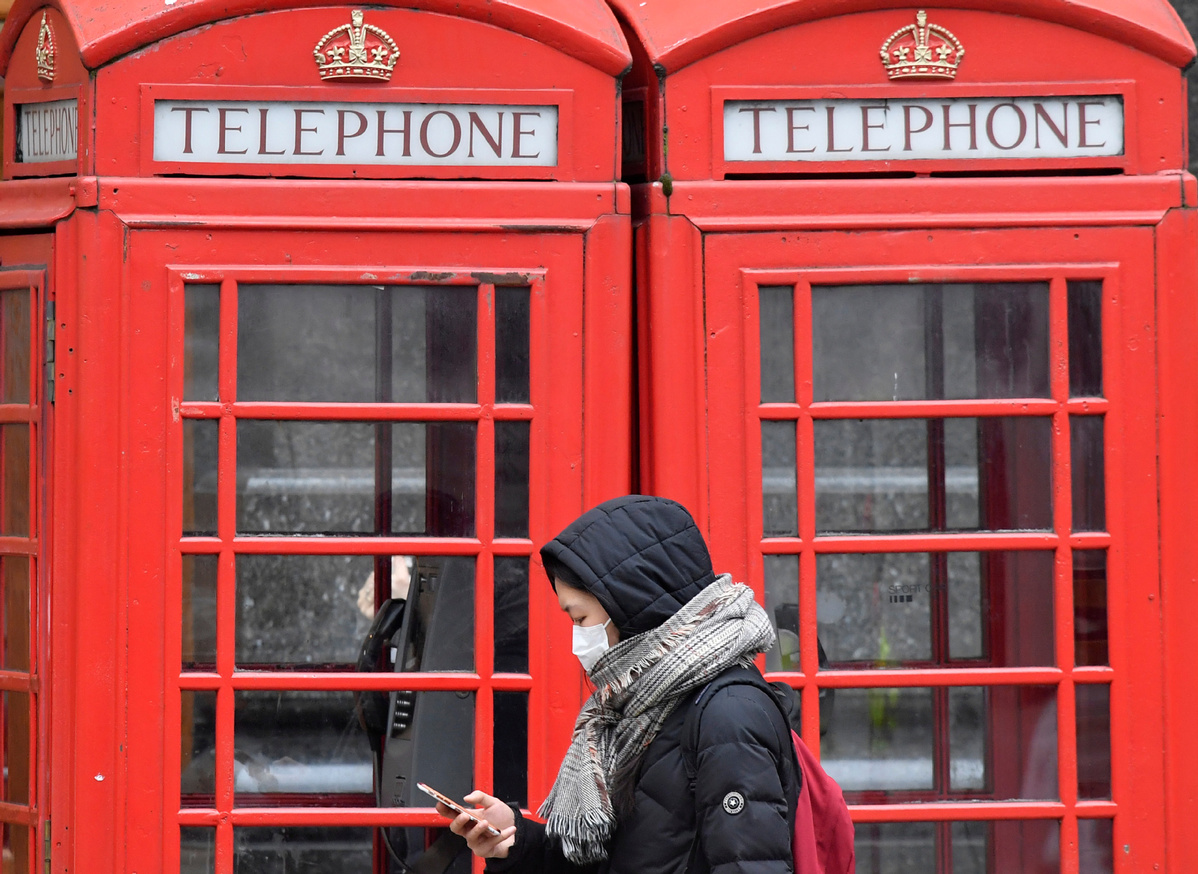UK set to step up virus fight
By EARLE GALE in London | China Daily Global | Updated: 2020-03-16 09:25

Elderly people likely to be told to stay at home to cut risk, warns minister
The United Kingdom is close to telling residents aged 70 and older to stay indoors, likely for an extended period of up to four months, as the nation battles the fast-spreading novel coronavirus and the COVID-19 disease it causes.
Health Secretary Matt Hancock told the BBC on Sunday the authorities will make the order "within the coming weeks".
He spoke as criticism of the government's response mounted, with an online petition launched on Thursday having gained more than 120,000 signatures by Sunday.
The petition, titled Implement UK Lockdown for Preventing Spread of COVID-19, was started by Beamari Alarva Suerte, who said: "The UK needs to follow suit the containment procedures of countries that have been greatly affected by COVID-19, such as Italy."
Sky News said hundreds of people, including scientists, have also written to the government, urging immediate "more restrictive measures" be brought in to enforce social distancing.
Hancock said the government is holding off on taking such steps until they are necessary and insisted the government was following the advice of its experts.
The pressure to act followed the UK death toll rising to 35 on Sunday, and with the total number of confirmed novel coronavirus cases in the UK hitting 1,372 on the weekend.
So far, the fatalities have involved people aged 60 or older with underlying health conditions.
Hancock said people without symptoms that include fever and dry cough can still visit elderly relatives for the time-being, but should keep two meters from them to mitigate the risk of infecting them.
In addition, he said, the National Health Service will stop non-urgent surgery and focus on training medics to respond to the crisis.
"I'm not going to go into any more detail on the timings because we want to be ready to say that when we judge, based on the scientific advice, that the time has come," he said on the Andrew Marr Show. "We know that when you ask people to do this sort of thing that they tire of it, it also has negative impacts... Every single person in this country is going to be affected, and they are going to have to do things... We will stop at nothing to fight this virus and I think people have got the impression otherwise."
Hancock wrote in the Sunday Telegraph newspaper that the situation was similar to the one the UK faced during the World War II.
"Despite the pounding every night, the rationing, the loss of life, they pulled together in one gigantic national effort," he wrote. "Today, our generation is facing its own test, fighting a very real and new disease."
But the shadow secretary of state for health, Jonathan Ashworth, said the government was being too ambiguous in its rhetoric.
"People just want clear advice," Ashworth told Sky News. "The prime minister should be out there daily speaking to the nation and explaining why things are changing."
Earlier, Prime Minister Boris Johnson also invoked a wartime spirit, and called on private hospitals to provide much-needed beds to supplement the NHS and for the makers of respirators to step up production.
The government is also understood to be considering requisitioning empty hotels for use as hospitals.
The UK is expecting to see 95 percent of its total novel coronavirus cases in the coming 10 weeks.
Meanwhile, the UK's Foreign Office is advising against all but essential travel to Spain in the wake of a growing number of infections there. And around 600 Britons are among passengers stranded on a Fred Olsen cruise ship in the Bahamas after five people on board were suspected of having the illness.
The Guardian newspaper reports that Europe is heading for a massive recession in the face of closed shops and bars, frozen supply chains, and canceled sporting events and cultural activities.
The head of the European Commission, Ursula von der Leyen, described the pandemic as "a major shock" to Europe's economies and vowed to make available 37 billion euros ($41 billion) to mitigate the damage.
Eurozone finance ministers will meet on Monday to see what else can be done.
In France, the government is warning of "severe" consequences for the economy.
And in export-led Germany, a survey for the Ifo Institute last week reported that 56 percent of German companies had reported "negative effects".
Spain and France have now followed Italy in announcing emergency restrictions. Spain, which had 288 deaths as of Sunday, ordered people not to leave home other than to buy essential supplies or go to work. And in France, where 91 had died as of Sunday, cafes, restaurants, cinemas, and shops were ordered to close.
A national lockdown continues in Italy, where there had been more than 1,440 deaths as of Sunday.
In the wake of China appearing to get its outbreak of the virus under control, the World Health Organization described Europe as the "epicenter" of the pandemic.
























